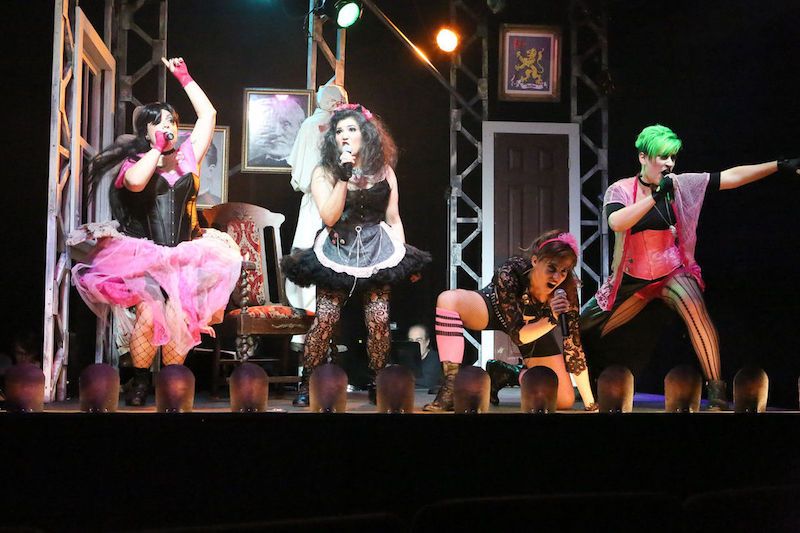
'Lizzie' explodes on the stage with a ferocious, hard rock energy that suits the murderous tale
By Tina Farmer
New Line Theatre takes a boisterous swing at the legend of Lizzie Borden with Lizzie, a rock 'n' roll musical that's one part horror story, one part rock opera, and all riot grrrl fury. The all-female cast attacks the concept with zeal and the result is hard rocking storytelling that grabs you by the collar and doesn't let go until the final chord.
The story explores the murder of the well-to-do Borden patriarch and his second wife, Lizzie and her sister Emma's stepmother. The two were brutally attacked and killed in their own house one day and daughter Lizzie was eventually arrested, charged, and put on trial. A lack of evidence, contradictory stories, and sheer disbelief that a woman could commit such a vicious crime, coupled with Lizzie's ability to hire the best defense lawyers money could buy, contributed to her eventual acquittal.
Lizzie, filled with rage, rhythm, and sexuality, presumes that Lizzie, after strong insinuation from her sister Emma, committed the murders. The show lets the story unfold in bits and pieces that not only infer Lizzie's guilt, but her motivations. Several scenes suggest the stepmother was greedy and plotting to disinherit the sisters. Songs reveal their father's incestuous fondness for his daughters. All the songs, like the story itself, are filled with a tension and uncertainty that is as hard hitting as the punk influenced melodies.
With a voice that easily turns from three-chord anger to the complex, multi-octave demands of a rock opera, Anna Skidis Vargas completely mesmerizes as Lizzie Borden. She moves fluidly between a showman, preening and growling like Freddy Mercury, to the gender-challenging virtuosity of the Wilson sisters and operatic range of Pat Benatar. All with the energy, disdain, and DIY FU attitude of early punk bands like The Runaways, Sex Pistols, and The Clash. Though the score offers the opportunity, the performance is all the work of Skidis Vargas and director Mike Dowdy-Windsor; the two truly bring this character to her peak. Skidis Vargas fills Lizzie with passion and dares us to join her in her rage.
Marcy Wiegert, Larissa White, and Kimi Short are bold, commanding, and seething with repressed longings of their own. As big sister Emma, Wiegert is the perfect partner-in-crime. With flashing glances and vocal licks, Wiegert turns curse words into meaningful lyrics, bringing dark edges and frightening thoughts to light with a conspiratorial sneer. Short adds a touch of bluesy rock that reverberates from her core, as well as expressions that artfully emphasize the discomfort the audience sometimes feels. The details of the crime and family history are simply unpleasant, Short acknowledges that, as does White. As neighbor and suggestively close friend Alice, White teases and entices, sometimes genuine, sometimes calculating, without missing a note. She shows genuine pain as clearly as her need for self-preservation.
Together the four women fill the theater with their story in a way that simply demands to be heard. Dowdy-Windsor directs with attention to detail and purposeful clarity towards the emotional and contextual story. The lack of a listed choreographer is interesting. There are moments that could benefit from more structure, but the free spirited approach succeeds more often than not. Important scenes are accompanied by almost uncontrolled dance and well-controlled vocal gymnastics that heighten the tension and are quite satisfying.
The book and music, by the creative team of Steven Cheslik-deMeyer, Alan Stevens Hewitt, and Tim Maner, are decidedly modern and the show borrows liberally from both Broadway and rock 'n' roll. Concert like numbers are interspersed with short, meaningful scenes, revealing exposition, and aching ballads. Though the music is often loud, hard, and fast, it never overpowers or distracts, and does much to guide the show's deeply emotional tone. Musical director Sarah Nelson and the New Line Band add the perfect touch here, enhancing the more rebellious, angry influences.
Rob Lippert's set supports the Borden story and period, using varying levels and his lighting design to provide rock show ambience. The transitions are seamless, enhanced by character changes and emotional shifts that feel equally effortless. Sarah Porter's costumes are the perfect finishing touch, expertly marrying periods by capturing the gothic and Victorian details prevalent in punk and modern rock genres. The choice of pink to contrast the mostly black costumes is brilliantly feminine and fierce, emphasizing the sense of empowerment that is the sub-context of the story.
And the story is compelling. Questions about Lizzie Borden's guilt or innocence continue to fascinate the public. This version includes more cursing and sexuality than many, with material sourced from the available information, but is otherwise familiar. Countless dramas and "whodunit" shows have featured Borden's story. The musical gives it a life of its own, with a clearly modern and bold, unrepentantly murderous, perspective.
Theatergoers who enjoy a driving beat, insistent melodies, and powerful vocals will find the show easy to embrace and a lot of fun to experience. From the haunting opening notes to the final anthemic rendition of "40 Whacks," New Line Theatre's Lizzie, in performance through October 21, grabs your attention and compels you to listen.


